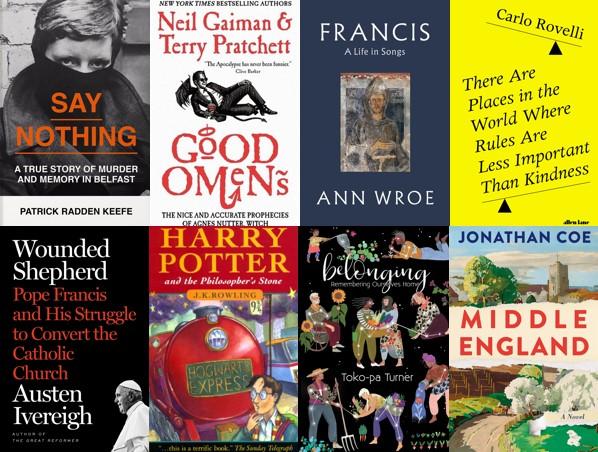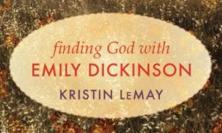
Lockdown has kept us all at home over the last year, which means that many people have had more time to read and have found solace in the written word. We asked some friends of Thinking Faith to tell us which texts have captured their locked-down imaginations. Enjoy browsing our lockdown library!
We have been reading:
- A Prayer Journal by Flannery O'Connor (chosen by Frank Cottrell Boyce)
- Say Nothing: A True Story of Murder and Memory in Northern Ireland by Patrick Radden Keefe (chosen by Roger Dawson SJ)
- Good Omens by Terry Pratchett and Neil Gaiman (chosen by Elizabeth Harrison)
- Francis: A Life in Songs by Ann Wroe (chosen by Nathan Koblintz)
- There Are Places in the World Where Rules Are Less Important than Kindness by Carlo Rovelli (chosen by Brian McClorry SJ)
- Wounded Shepherd: Pope Francis and His Struggle to Convert the Catholic Church by Austen Ivereigh (chosen by Tim McEvoy)
- The Harry Potter series by J.K. Rowling (chosen by Frances Murphy)
- Belonging: Remembering Ourselves Home by Toko-Pa Turner (chosen by Iona Reid-Dalglish)
- Middle England by Jonathan Coe (chosen by Luke Taylor SJ)
A Prayer Journal
Flannery O’Connor (Farrar, Strauss and Giroux, 2013)
Some jobs are a constant struggle with the commute, or the boss. If you’re a teacher, you have to face the kids. A sailor has to face the sea. But writers mainly struggle with themselves. More so than ever during lockdown. So I’ve been looking to a lot of writers’ prayers for help and inspiration. Robert Louis Stevenson used to say public prayers morning and evening from the porch of his house in Vailima in Samoa. These prayers are lit by his sense of obligation to his fellow humans, and have a sense of struggle and story-book nobility (‘bring us to our resting beds weary and content and undishonoured’). It’s humbling to see how much he desired to keep striving no matter how ill and far from home he was. And how much trust he had in God.
But the prayers that have really been with me this lockdown are the ones in Flannery O’Connor’s very different prayer journal. These were written in a kind of school notebook when she was about 21 and had just left Savannah for university in Iowa. They are the opposite of Stevenson’s resolved and composed public petitions. They’re a free-flowing conversation with God, full of doubt, yearning and questioning. They’re painfully honest and intimate: ‘Today I have proved myself a glutton – for Scotch oatmeal cookies and erotic thought. There is nothing more to say of me.’ When I’m planning a piece of work myself, I tend to default into writing a kind of memo to myself rather than a formal plan (‘you need a better joke to open the second chapter’, etc.) because the only companion I have at these times is the page. God was Flannery’s companion in creativity and she let the Holy Spirit blow her ink dry. ‘Tonight is not disappointing’, she says, ‘because you have given me a story.’
Frank Cottrell Boyce is a screenwriter and author.
Say Nothing: A True Story of Murder and Memory in Northern Ireland
Patrick Radden Keefe (Harper Collins, 2019)
I served in Northern Ireland three times in the 1980s as an infantry officer in the Royal Green Jackets and I know about a dozen soldiers who were killed there. Patrick Radden Keefe paints the picture of that time, captures its mood and above all portrays its awful legacy of violence, espionage and compromise, in which truth and justice are almost impossible to find and, for so many, trauma refuses to heal. He uses the story of Jean McConville who was ‘disappeared’ by the IRA, allegedly for ‘saying something’, leaving alone her eight children who spent the next thirty years hoping she would turn up and then looking for her grave. He takes the reader from the worst of the Troubles through to the peace negotiations, and beyond the Good Friday Agreement to the present day.
Lockdown has had an eerie resonance for me of my time in Northern Ireland: of not being able to go out freely, of someone/something out there trying to get you, the monotony of the routine, the tedium of the same company and same experiences – but this time I carry a face mask and hand gel, and not a flak vest and a rifle. And there is the same vague sense of disappointment with myself: in Northern Ireland I realised that I was not a heroic leader but a very ordinary platoon commander, highly unlikely to win a Military Cross; in lockdown I realised that I am not a Jesuit saint who, like Aloysius Gonzaga, ministers to plague victims or does extraordinary things in the world’s hour of need. Lockdown, like being locked up, deprives us of many of the things that humanise us and make life joyful. A few transcend that; a lot don’t.
Say Nothing is a gripping read and a first-class introduction to those who don’t understand the Troubles or who spent the last forty years listening to David Bowie rather than the news from Northern Ireland. Very few come out of this story well, but at least ‘something’ has been said.
Roger Dawson SJ is Director of St Beuno’s Jesuit Spirituality Centre in north Wales.
Good Omens
Terry Pratchett and Neil Gaiman (Gollancz, 1990)
Have you ever saved a book for a rainy day? When I bought Good Omens by Terry Pratchett and Neil Gaiman three years ago, I decided I’d save it for a time when I felt I needed it. I have read and re-read every one of Terry Pratchett’s Discworld books (I have yet to gain a taste for Neil Gaiman) and when Pratchett died in 2015 it honestly felt like I was losing an old family friend, not someone I’d never even met. I put off reading Good Omens because it was the last Pratchett book left that I could read for the first time.
That’s why I turned to Good Omens during the first lockdown. Since it is a book about the end of the world, it seemed like a good choice. I enjoyed Pratchett’s humour in much the same way you would enjoy leafing through a scrapbook left by a departed relative. It was hugely comforting to read his turns of phrase. Good Omens is strangely nostalgic, since the novel was written in 1990. We sometimes forget how much the world has changed.
Something I love about Pratchett’s work is the solid moral core to all his much-loved characters, whether that’s the Grim Reaper in Discworld or, in this case, an angel, a demon and a gang of schoolchildren. What really surprised me was the ecological theme in the novel (the Four Horsemen of the Apocalypse include Pollution), as well as the critique of globalism and capitalism, which would make it a companion volume to Laudato si’. Most of all, I loved the way everyday kindness and friendship are the real heroes of the novel. Just what I needed during a pandemic.
Dr Elizabeth Harrison is Spirituality Resources Coordinator for the Jesuits in Britain.
Francis: A Life in Songs
Ann Wroe (Penguin, 2018)
Quarantined alone in a hotel room, I wanted to read something that would demand my commitment and keep me awake. I chose Francis: A Life in Songs by the author and obituarist Ann Wroe not just for its content but for its structure: four sections (Conversion, Mission, Oblation, Consummation), within which are 44 incidents from St Francis of Assisi’s life (a scene from his childhood stands alone as a prelude). Each incident is made up of four components: extracts from Francis’ biographies, a poem addressed to Francis (‘you’), a poem offering a contemporary juxtaposition, and a short lyric that leads to the next incident. It’s a book designed for rhythmic reading, with moments for rest between each explored idea.
It took me a few pages before I accepted that reading this book was going to a be small act of obedience. What this meant for me was that I was going to read the book slowly through to its end regardless of whether the poems that day had given me pleasure or insight or not. I hesitated because I was unsure this commitment had any value to it, because I didn’t trust whether this was ‘the right book’, because there were other ways I thought I could escape from the silence. Every day I read a few pages. Though I didn’t realise the Franciscan pun at the time, I was consciously putting on a habit. It helped get me through. And some mornings I was arrested, in the same way as these students boozing on a train in Brighton, whose carelessness is converted to an unintended depth:
…they fall
silent at sight of it, till one remarks
into the dark, ‘Jesus, that’s beautiful’.
(from ‘Jesus’, in the ‘Oblation’ section)
Nathan Koblintz is a former member of the Thinking Faith editorial board and a regular contributor to the journal.
There Are Places in the World Where Rules Are Less Important Than Kindness
Carlo Rovelli (Allen Lane, 2020)
After a troubling and exhausting day in unfamiliar territory (Mbour in Senegal), theoretical physicist Carlo Rovelli decides to go into a mosque and enters, shoes in hand. He is stopped. Shoes may not enter. But a young man puts the shoes into a plastic bag and Rovelli proceeds, bagged shoes in hand, into a clear and serene place which gives a profound peace he has not found before. Rovelli says he has learnt something about what it means for people to abandon themselves to God – ‘one small additional thing, about the complexity of being human.’ Not bad for a self-confessed atheist. And being given a bag to carry his shoes? Well, ‘There Are Places in the World Where Rules are Less Important Than Kindness’ – which is the title of his collection of 47 very short journalistic pieces.
Rovelli says he is an atheist because he doesn’t like being good out of fear or because of God rather than simply doing good. He finds communion with friends rather than Godly congregations. Nature is beautiful not because God made it, but because it is beautiful. Humble suggestions about morality are better than a church monopoly. Well, it seems best not to engage argumentatively with these ‘reasons’, but to listen, with the graciousness of the mosque’s plastic bag, to how church is heard ‘outside’. Listening may help shape a post-Covid church for the benefit of all.
Still, ‘atheism’ makes up scarcely ten percent of Rovelli’s book. The other pieces are diverse and illuminating. I enjoyed what he said, very relevantly, about statistics, about science and scientists. The Belgian priest and ‘big bang’ physicist, Georges Lemaître, is a star. He found that both Einstein and Pope Pius XII had got some things wrong... A good read indeed.
Brian B. McClorry SJ is a member of the Corpus Christi Jesuit Community in Boscombe.
Wounded Shepherd: Pope Francis and His Struggle to Convert the Catholic Church
Austen Ivereigh (Henry Holt & Co., 2019)
The first lockdown in spring 2020 finally gave me the opportunity to sit down and read a book I had been wanting to read for a while: Austen Ivereigh’s Wounded Shepherd: Pope Francis and His Struggle to Convert the Catholic Church. I had been completely gripped by the unexpected speech that Pope Francis made from a rainy St Peter’s Square in March 2020, at the beginning of the pandemic, and I wanted to dive deeper into the thinking of this man and his vision for the Church at this time. I wasn’t disappointed. Wounded Shepherd reads in places like a Mafia-based thriller, exposing the resistance to reform that Francis has encountered so far in his papacy, but at its heart is a simple, profound call to conversion: to put Christ back at the centre of the Church. It has shaped my thinking in important ways during these last months and given me both a larger perspective on the huge changes we are all undergoing at this strange and uncertain time, as well as hope for the future direction of the Church in the world.
A piece of sheer, delightful escapism has been Richard Osman’s The Thursday Murder Club (Penguin, 2020). A Midsomer-style murder mystery, set in a modern retirement village, by the unlikely hand of a TV celebrity best-known for his appearances on Pointless, this was exactly what I needed to dip into this January. Apparently, Stephen Spielberg has already bought the film rights so expect to see this on screen in the near future, probably starring the ubiquitous Dames Dench and Smith. Until then, this is a book to enjoy.
Tim McEvoy is a spiritual director at St Beuno's Jesuit Spirituality Centre in North Wales.
The Harry Potter series
J.K. Rowling (Bloomsbury, 1997-2007)
A generous gift, a promise to a seven-year-old and a lockdown that robbed me of the excuse of not having the time: these were the catalysts that led me to abandon years of protest that Harry Potter wasn’t for me. If all that was to be gained from reading the series was filling a gap in my cultural knowledge, then it might be worth it, I told myself. It might even provide a bit of much-needed escapism.
Seven books later, and mission (partly) accomplished. Do I now know who Dobby the house elf is? Yes. Will I be booking a ticket to the Harry Potter Experience when restrictions lift? Well, no – but I would bite your hand off just to go to Watford. Because it was precisely the opposite of escapism that I found in the series. While I skim-read lessons in wizarding folklore or the choreography of wand-fought battles, I paid attention to every teenage eye-roll, squabble or embrace, any moment in which the rewards and trials of relationships came to the fore. Not once did I find myself wishing I could whip up a batch of Polyjuice Potion, but on countless occasions I longed for a world in which students could pile into crowded common rooms and I could be within whispering distance of a friend. The magic that the stories held for me was that of Chesterton’s fairy tales, which ‘make rivers run with wine only to make us remember, for one wild moment, that they run with water.’ Spells and potions aside, what matters is with and for whom we choose to fight. The considered and loyal choices and sacrifices for one another that Harry & co make time and time again rang truer in lockdown than they might do at any other time. See you all in The Three Broomsticks.
Frances Murphy is Editor of Thinking Faith.
Belonging: Remembering Ourselves Home
Toko-Pa Turner (Her Own Room Press, 2017)
In a world which I so often find encourages us to pathologise and outlaw uncomfortable emotions (pain, grief, anger, lust…), this book came as a refreshing invitation to do the very opposite, to practise the art of being hospitable to the whole gamut of my experience – nasty and nice. Not an easy task, I might add! Indeed, not just to be hospitable, but to trust that within that which I most fear or resist may well lie deep wells of wisdom. Toko-Pa explores this through dreamwork, which it turns out is a rich playground for my learning how to live a more full and integrated life. In my dreams, there are often characters or aspects I am afraid of, that feel threatening, that I resist for one reason or another – those that turn up and I want to run or turn away from. What I have been finding recently is the astonishing shifts that can come when instead of turning tail, I manage to foster an attitude of curiosity, to remain with those parts and dialogue with them imaginatively, to listen. More often than not they lead me to gift, these outlawed parts of myself. Toko-Pa talks about dreamwork as a way of learning to revoke the ‘internal vow of smallness’ I have made, or to liberate ‘the cringing of the spirit’. In a world that often feels unstable, uncertain, painful and scary at the moment, in the midst of yet another lockdown, these feel like really helpful and liberating lessons.
Iona Reid-Dalglish works in spirituality for the Jesuits in Britain and produces Imagine, a guided meditation with the imagination.
Middle England
Jonathan Coe (Penguin, 2018)
‘How did Brexit happen?’ is the question behind Jonathan Coe’s Middle England, whose narrative begins in April 2010 and ends a few months after the 2016 referendum.
I had read sociological and political accounts of Brexit, and far too many passionate social media posts. Coe’s novel gave me something different. He describes Brexit through characters whose lives uncannily resemble my own, and those of my family and friends.
Reading a novel (and even more, writing one) requires empathy. In our current political climate, we frequently dismiss each other with labels or caricatures. Coe coaxes us instead to enter the complex place from which the other speaks. His Remainers and Brexiteers are cosmopolitan and provincial, old and young, white and Asian, but also father and son, daughter and mother-in-law, friend and lover.
I suspect that Coe is personally appalled by the vote. Yet the attention he turns upon the sad tears in our social fabric is humorous. The light allegory of the opening scene, in which an older Colin decides to leave a party early, dragging his young son Benjamin with him, was the first of many times that the book made me laugh aloud. And what more British reaction than humour?
Living in France during the transition, I am frequently asked by French friends to explain Britain’s exit. Instead of trying to explain, I think in future I will offer a copy of this worthy heir of the English social and comic novel.
Luke Taylor SJ is studying philosophy at Centre Sèvres in Paris.





